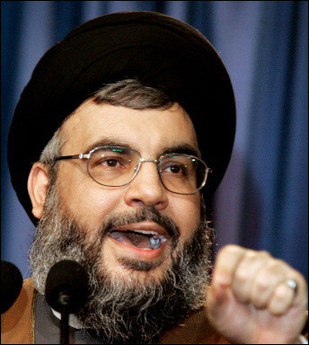 BEIRUT (Reuters) – The head of Lebanon’s Hizbollah guerrilla group has called on Saudi Arabia and Egypt to intervene to resolve a crisis brewing in Lebanon. In an interview published on Wednesday in the pan-Arab al-Hayat newspaper, Sayyed Hassan Nasrallah appeared to back Saudi mediation to ease tensions between Lebanon and Syria, and called for efforts to resolve rifts among Lebanese leaders.
BEIRUT (Reuters) – The head of Lebanon’s Hizbollah guerrilla group has called on Saudi Arabia and Egypt to intervene to resolve a crisis brewing in Lebanon. In an interview published on Wednesday in the pan-Arab al-Hayat newspaper, Sayyed Hassan Nasrallah appeared to back Saudi mediation to ease tensions between Lebanon and Syria, and called for efforts to resolve rifts among Lebanese leaders.
"Intervention is a must and there can’t be any Arab delay to do what is necessary," Nasrallah said. "The situation in Lebanon is bad and it has dangerous repercussions." Lebanon has been gripped by a political crisis since pro-Syrian Shi’ite ministers boycotted the cabinet five weeks ago, paralyzing a government dominated by anti-Syrian officials of a Sunni-led parliamentary majority coalition.Saudi Foreign Minister Prince Saud al-Faisal has said that Saudi Arabia has presented Lebanon and Syria with a plan to defuse tensions between the two countries.
.
He told a British newspaper this week that the kingdom had made proposals for an agreement, but was waiting for a response from Beirut and Damascus.
The crisis escalated in recent days with a war of words between pro-Syrian Hizbollah and fierce anti-Syrian Druze leader Walid Jumblatt that evoked memories of the 1975-1990 civil war.
The civil war ended after a 1989 agreement by Lebanese parliamentarians at a meeting in Taif in Saudi Arabia.
Anti-Syrian politicians in Beirut have sharply criticized reported Arab efforts to mediate, with some even calling for the toppling of Syrian President Bashar al-Assad.
"We support any Arab initiative and denounce any effort to spoil any Arab initiative," Nasrallah said, warning that tensions among the Lebanese also gave reason for alarm.
"I don’t call on Saudi Arabia, Egypt or the Arab League to intervene between Lebanon and Syria only, but I also call them to intervene between the Lebanese," the leader of the Shi’ite Muslim guerrilla group said.
"If the Lebanese are left to themselves, they would not be able to build their country with the current mentality."
Hizbollah, a key force behind Israel’s withdrawal from south Lebanon in 2000 after a 22-year occupation, is facing pressure to give up its arms after a 2004 Security Council resolution.
International pressure and a Lebanese public uproar after the assassination in February of former Lebanese Prime Minister Rafik al-Hariri forced Syria to end its 29-year military presence in Lebanon two months later.
A U.N. inquiry implicated Syrian security officials and their Lebanese allies in the murder. Damascus denied any role.
© Reuters 2006. All Rights Reserved.



